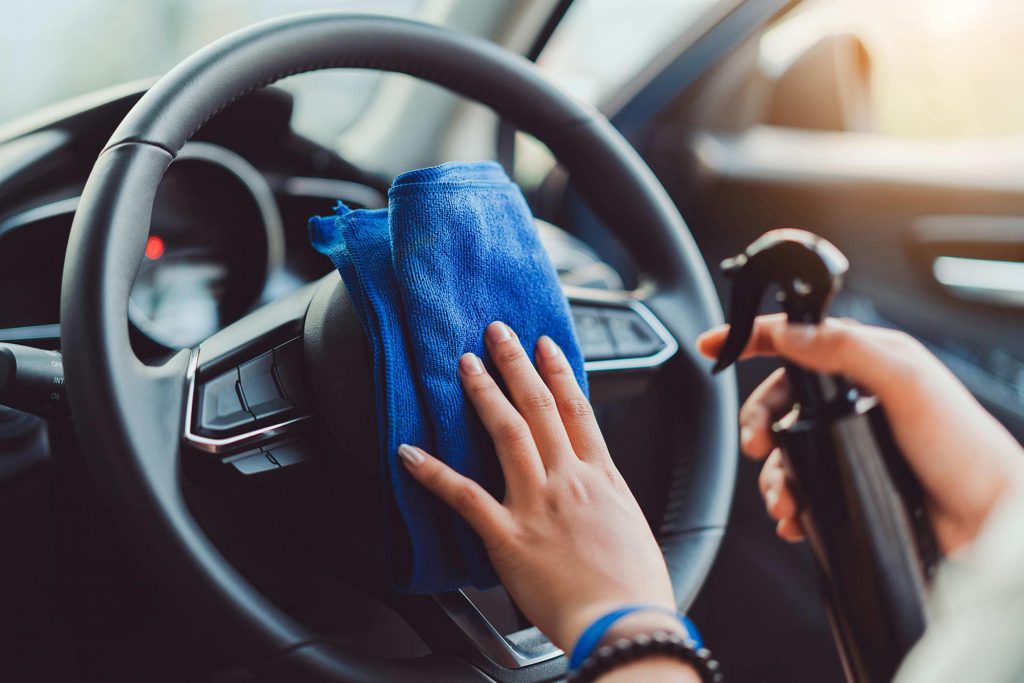The steering wheel is the most high-tough area inside your car. Over time, the wheel will be smeared with your palm’s sweat and body oil, as well as dust, dirt, grease, and God knows what else, becoming a hotspot for bacteria. Besides the dirtiness, a slippery steering wheel can also affect your handling and control, which can spoil your driving experience and in some cases can affect your steering. Knowing how to clean steering wheel is a basic car maintenance tips that all car owners must know to keep the interior of their beloved vehicle pristine and comfortable. This article will teach to the right tools, cleaning solution, and the steps to properly clean 6 types of steering wheels.
Contents
How To Clean Steering Wheel And Make It Shine Again
Cleaning hard plastic steering wheels
Knowing how to clean a steering wheel made from hard plastic is extremely easy. All you need is regular soap or dishwashing liquid, water, and a dry towel. You can either use a brush, a dish sponge, or a rough tea towel, soak it in warm soapy water, and scrub away. Just make sure you’re not dripping water everywhere.
Another convenient way is to use a water spray so you can easily control the amount of soapy liquid used, but be careful as spraying also means water can reach the surrounding areas inside your car, which might damage some fragile upholstery and leave them damp and moldy. Afterward, use a towel to dry the wheel thoroughly. And as with any cleaning inside a car, it’s best to open the window to allow for air circulation, so that the wheel will dry out quicker (given that you park your car securely in your garage of course).
Cleaning leather steering wheels

While cleaning plastic steering wheels is the easiest, cleaning leather steering wheels requires the most care in selecting the right cleaner as well as during the cleaning process. Now leather is the most expensive material, so it’s important to know how to clean a leather steering wheel without damaging it. Many car owners have thought that this should be left to the professionals since it is too fragile.
It is actually very simple and you can totally do it in your own garage. Most of the leather steering wheels are very easy to scratch or even wear away, so don’t be too aggressive with scrubbing and wiping. You will need to use a special leather cleaner made particularly for this material, a soft microfiber cloth to be as gentle as possible, and a separate leather protector product.
Shake the leather cleaner before spraying, then spray the wheel thoroughly. Let it sit for 3 minutes, then wipe it clean with a soft microfiber cloth. After letting the wheel dry completely, you can apply a protective product for leather. If you have some lying around in your kitchen, you can follow many car owners who have used coconut oil as a protective coat for leather material with great success. It softens the leather, gives it a natural shine, and protects the leather from cracks, scratches, liquid spills, sweat, and the elements.
One important note with leather steering wheels and all leather seats, as well as imitation leather parts, is that both types of materials have urethane coatings for protection, so they are safe to clean with alcohol.
However, while using alcohol is effective, convenient, and cheap, it is not the right cleaning solution for leather in the long term. This is because most leathers are dyed, so over time, cleaning leather regularly with alcohol can lead to unsightly discoloration, which will make your wheel and your interior in general look old and worn.
Another cleaning solution to stay away from when cleaning your steering wheel, as well as any upholstery, is bleach or hydrogen peroxide, as it is too abrasive and will damage the leather and imitation leather upholstery.
Watch the video to learn more about the process:
Cleaning Imitation leather steering wheels
This type of material is also called fake leather, synthetic leather, or PVC plastic. Imitation leather is very smooth and actually does not absorb water as much as real leather, so you can clean this type of wheel using a regular spraying cleaner and a soft cloth.
This material is not all that durable though and should not be exposed to too much liquid and soap, so it’s best to use a less abrasive solution with little chemicals but more natural ingredients instead. A good type of such a cleaning spray is one made from mostly white vinegar and essential oils that have disinfectant and deodorant effects like tea tree oil or rosemary oil.
Just spray the solution on the soft cloth and wipe the wheel thoroughly multiple times until it’s no longer greasy and dusty. Remember to wipe off any excess moisture completely by a clean towel afterward and it’s a good idea to leave your window open for a while to let the wheel air dry as quickly as possible to prevent mold and unpleasant odor.
Read more:
- How To Clean Car Windows Without Streaks
- Best Ways To Clean Bugs Off Windshield
- How To Clean Alloy Wheels
Cleaning Suede and Alcantara Steering wheels
Suede is a variation of leather, it is real leather but is very porous. It has a soft, peach-like fuzzy, and napped texture, or can be described as having a velvety feel. Suede steering wheels are very common in race cars thanks to their enhanced grip. Nowadays, suede steering wheels have become more and more popular on new models.
You might have also heard of Alcantara steering wheels. These are different from suede, but due to their similarity in texture, many think that they are the same and use these terms interchangeably.

Alcantara is a brand name for a synthetic suede-like material, similar to microsuede or Ultrasuede. Alcantara is made from a blend of polyester and polyamide, which makes it a cousin of microfiber towels, giving it a very similar feel to real cowhide suede.
Both suede and Alcantara are durable and pliable, but the problem is they are also too readily absorbent of many things wet and dry. They soak up oil from your hands so easily, and the velvety surface will become matted and the peachy fuzz will begin to lay flat. Due to the fuzzy texture, they also quickly gather dust and dirt.
While the soft, supple feel of these materials may make you think that they are fragile, they are actually quite robust. You can use any cleaning solution made specifically for fabrics, a detailing brush with slightly stiff bristles but not too abrasive though, and a clean microfiber towel.
Spray the solution on the wheels, and spray some extra on trouble spots. Let the solution sit for a few minutes to effectively break down the caked-up dirt, grime, and oil buildup, and spray some solution on the detailing brush as well. Then use the brush to gently scrub the surface in small, circular motions to remove the buildup. Then use one, or more, microfiber cloth to wipe it clean. Repeat the steps if needed, then let your wheel air dry completely.
Cleaning synthetic resin steering wheels
Vehicle mechanics are very thoughtful when covering polished paint on top of this type of wheel for protection. To make this barrier back to tip tip-top stage, you can wash with water and regular soap. However, you must know that this paint is different compared with car furniture paint. For that reason, make sure to never use polish products since they make the wheel very slippery. And these products do not come out of your synthetic resin wheel easily.
Cleaning natural wood steering wheels
Natural wood steering wheels can crack easily, especially when exposed to moisture, so cleaning steering wheel of this type using regular soap and water is not recommended. Fortunately, there are many tricks to clean this type of wheel without leaving any damage or blemish on the surface, and one of them is to use a natural steering wheel cleaner specifically for wood such as wood polish products.
These products not only get rid of buildups and debris and make the wooden surface clearer, shinier, and smell heavenly but also protect the wood grains from oxygen, direct UV light, as well as damaging sweat and oil from your palm.



